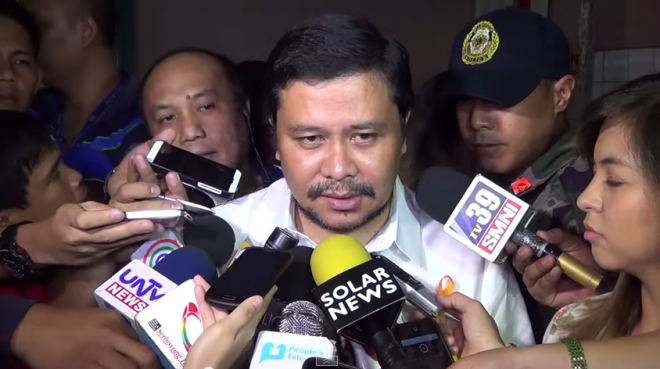MANILA — Detained former senator Jose “Jinggoy” Estrada, Jr., and his wife have asked the Supreme Court to declare certain provisions of the Anti-Money Laundering Act (AMLA) unconstitutional for violating their right of due process and privacy.
The Estradas raised this plea, as they questioned the Sandiganbayan Fifth Division’s March 2015 resolution denying his attempt to block the use of an inquiry report by the Anti-Money Laundering Council (AMLC) as evidence in his P183.8-million plunder case.
The Estradas specifically questioned Sections 10 and 11 of the AMLA, which bestows upon the AMLC the authority to freeze bank accounts and inquire into bank deposits.
According to the Estradas’ 82-page SC memorandum, the provisions violate Sections 1 (right to due process), 2 (right against unreasonable searches and seizures), and 3 (right to privacy) of Article III of the 1987 Constitution,
The Estradas argued that they have a constitutional right to notice and hearing, before any inquiry could be made on their bank accounts.
This was supposedly violated when the AMLC drew up an inquiry report that was submitted by the Office of the Ombudsman as evidence to pin him down for the alleged receipt of kickbacks from the Priority Development Assistance Fund allocations purportedly diverted to fake foundations controlled by businesswoman Janet Lim-Napoles.
The Estradas also assailed the retroactive application of the 2012 amendment of AMLA’s Section 11 under Republic Act No. 10167. Since the bank accounts were opened from 2005 to 2012, they argued that the old Section 11 should be applied, and the accounts should not have been inspected without notice to them.
The memorandum stated that wife Ma. Presentacion Vitug Ejercito was denied due process when the surveillance of her bank account was later used as evidence against the former senator in the alleged plunder of his Priority Development Assistance Fund allocations.
It stated that Section 11 of the AMLA, specifically its mention of “related accounts,” suffered from vagueness and overreach.
In the Estradas’ case, the provision was allegedly “so broad that it intrudes into Petitioner Presentacion’s right to privacy and personal security, as well as into privileged communication between husband and wife.”
The memorandum also said it was “not fair play” for the AMLC to be allowed to probe bank accounts simply on the basis of government agents’ recommendations that are delivered in an ex parte discussion without giving the affected party the chance to respond.
It said that the criteria to justify a search under the AMLA is “below the ‘probable cause’ test laid down in the Constitution,” as the government can only put up bank inquiries on the basis of “mere suspicion” even without the facts to establish a well-founded belief that a crime has been committed.
The Estradas dubbed such inquiries as a “plain and simple ‘fishing expedition,” because it is only afterwards that the “hunch of the government agents may prove to be right” and the probable cause could be had.
“This is dangerous logic, for the ‘search’ is justified from the premise that the suspect is guilty,” the memorandum read.
The memorandum also stressed the confidential nature of banking relations, which would be broken by the “unreasonable search” provided by the AMLA.
“The court cannot assume that a depositor’s assent to access by the banks implies assent to access by others. For sure, it is not for the purpose of according government agents ex parte surveillance powers of Orwellian magnitude,” the memorandum read.
It said the AMLA’s search powers are “analogous” to the power of the government under the Cybercrime Prevention Act to collect real-time traffic data, struck down by the SC as unconstitutional in 2014.
The memorandum also noted that the Republic Act No. 10167’s amendment to Section 11 of the AMLA in 2012 was applied in the Estradas’ already-completed transactions from 2005 to 2012 retroactively.
The said amendment clarified that “related accounts” could be covered by the AMLC’s ex parte inquiry, but the memorandum stated that Mrs. Ejercito still retained the right to due process because Congress has no power to diminish a fundamental right.
The Estaradas also concluded that the “there is no doubt that the AMLC investigations in the case below were fishing expeditions launched against opposition senators.”
“The timing and the manner in which they were conducted show that there was no probable cause to inquire into the accounts of Accused Sen. Estrada and those of related accounts,” they told the high court.
Estrada’s submission of his memorandum, as directed by the Supreme Court, comes amid a recent push by Rep. Gloria Macapagal-Arroyo to limit the Bangko Sentral ng Pilipinas’ oversight powers over the AMLC after its criminal investigations were used as a “tool of selective justice.” Arroyo’s statement on Monday also echoed President Rodrigo Duterte’s apparent frustration over the AMLC’s alleged refusal to provide information regarding his staunch critic, Senator Leila de Lima. SFM


